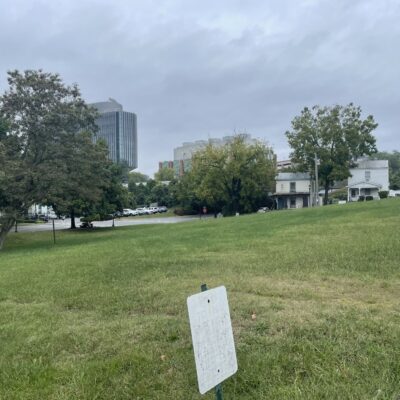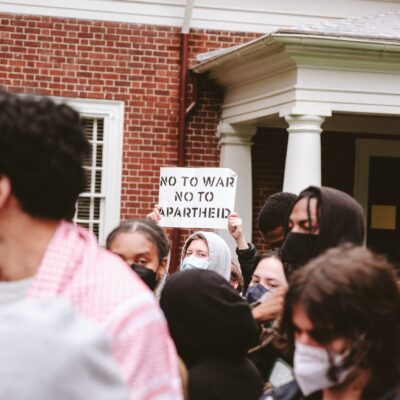Charlottesville Commonwealth’s Attorney Dave Chapman spent nearly three hours June 17 presenting almost every scrap of information about Virginia Alcoholic Beverage Control agents’ March 18 takedown of UVA student Martese Johnson that left him with 10 stitches on his forehead. The prosecutor, who dropped charges against Johnson June 12, was sympathetic toward both the student and the agents, and discussed the incident “for understanding and for prevention.”
Chapman concluded it was “inappropriate” to pursue criminal charges against Johnson because “Mr. Johnson was not in fact committing a criminal event” when he handed his valid ID to the owner of Trinity Irish Pub and because “Mr. Johnson received serious injury.”
He said he could have prosecuted Johnson for obstruction of justice because it’s illegal to resist temporary detention in Virginia, but “that would be a bad idea. It would be inappropriate.”
As for the ABC agents, Chapman asked the couple dozen people assembled in City Council chambers how they would feel if they were law enforcement officers in a case like this and there was widespread condemnation and accusations of racism before all the facts were in.
As ABC agents, they had “articulable” reasonable suspicion to detain Johnson after seeing his ID rejected at Trinity’s door when Johnson recited the wrong zip code, said Chapman. “None of the officers committed a criminal offense. Had we thought for a moment that malice, that racial animosity or intentional or reckless disregard of their authority as sworn law enforcement officers had existed, we would not have hesitated to pursue charges- against anyone who was so involved.”
Instead, the Rashomon scenario cobbled together from 15 witnesses at the scene and 52 all together indicates that Johnson and the lead ABC agent likely didn’t hear each other in the crowd outside Trinity, that Johnson pulled away from a perceived stranger grabbing his arm, that the bloody takedown was more a clumsy trip than police brutality—although two witnesses described the agents as slamming Johnson to the ground—and that it all went down in little more than 30 seconds, as partially captured on a camera across the street that was missing six seconds—but had not been tampered with, Chapman assured.
How Johnson ended up on the ground was a factor Chapman considered, as well as whether race was involved. He also looked at the use of force in investigating “a relatively minor offense.” Added Chapman, “That’s an important one.”
According to the statement of the lead ABC agent, Johnson had “bloodshot, glassy eyes” when he approached him and Johnson said something the agent couldn’t hear. He grabbed the arm of Johnson, who shrugged and walked away. That’s when the first agent, joined by a second, “actively began taking him to the ground,” and Johnson was “actively resisting,” recounted Chapman. “We all fell to the ground,” said the agent in his statement, who also noted he could “smell the strong odor of alcoholic beverage coming off him.”
Based on interviews with friends who’d been with Johnson earlier, as well as others he encountered that night, Johnson had been drinking that night to the “level of under the influence,” said Assistant Commonwealth’s Attorney Nina Antony. That’s different from the “gross intoxication of a drunk in public charge,” in which a person is falling over drunk and a danger to themselves and others, explained Antony.
Johnson was charged with drunk in public and obstruction of justice. Although he was 20 at the time, he was not charged with underage consumption of alcohol, and Chapman said he had no evidence of Johnson’s blood alcohol content.
The unnamed second ABC officer told investigators, “I found myself falling to the ground and landing on my elbow,” as he struggled with the resisting Johnson. Another witness described the fall as “too sloppy to have been done on purpose.”
Community member Jim Bundy asked about the takedown in the contest of Ferguson. “People are tired of seeing tragic results from things that aren’t so important,” said Chapman.
Bundy said he understood Chapman’s reasons for not charging the ABC agents. “I still think the officers need to be held accountable,” he said. “I don’t think they need to be prosecuted, but I found their actions questionable. In 30 seconds Martese Johnson was walking from a bar to on the ground. That’s such a short time. Surely something could have been done to avoid a violent response.”
“I thought it was excessive,” said Albemarle-Charlottesville NAACP president Rick Turner. “I don’t think he had to be taken down like that.” Turner also said he believes the the situation was racially motivated.
Daniel Watkins, Johnson’s attorney, issued a statement after Chapman’s presentation: “Our position is and always has been that police lacked justification to seize Mr. Johnson.” He also noted that the three ABC agents declined to participate in the Virginia State Police investigation.
It’s not over for the agents, as Chapman pointed out. They still have to face an ABC administrative review.
Prosecutor Dave Chapman used the Martese Johnson arrest as a teachable moment.
STAFF PHOTO





